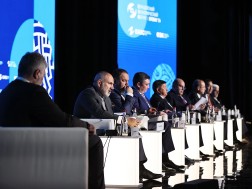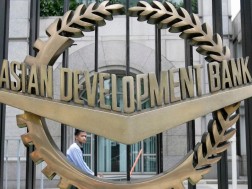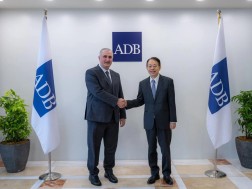More rapid digitalization and leveraging the private sector can support the recovery from the coronavirus disease (COVID-19) pandemic, accelerate regional cooperation, drive innovation, and help countries adapt to new and evolving forms of globalization, participants at the 19th Central Asia Regional Economic Cooperation (CAREC) Ministerial Conference heard today.
“As the world emerges from the pandemic, we must revive our regional cooperation efforts with a spirit of open regionalism to enable CAREC to seize the opportunities of renewed globalization,” said ADB President Masatsugu Asakawa in his keynote address. “This means expanding connectivity, rejuvenating trade, and embracing innovation and technology in ways that put the people of the CAREC region at its center. There is huge potential for adopting technologies that improve the monitoring of cross-border health threats, enable the use of telemedicine and online education, and raise food safety standards—while the private sector can play a crucial role as a driver of innovation.”
The virtual event, under the theme "People-Centered Regional Cooperation in the Post-COVID Environment," was attended by President Mohammad Ashraf Ghani of Afghanistan, ministers and senior officials from the 11 CAREC countries, and representatives from development partners. The event was hosted by the Government of Afghanistan. Finance Minister of Afghanistan Abdul Hadi Arghandiwal chaired the meeting and ADB Vice-President Shixin Chen co-chaired.
“Regional connectivity is one of the top priorities of our economic development agenda,” said Mr. Ghani in his special address. “The CAREC platform can help us fully integrate the infrastructure, systems, and programs, and share our common cultural values. The CAREC Program is a proactive facilitator of practical, results-based regional projects and policy initiatives critical to sustainable economic growth and shared prosperity in the region.”
As a high-level strategy and policy body, CAREC is a partnership for its 11 members to promote economic growth and sustainable development through cooperation. Since its inception in 2001, the program has financed 208 regional infrastructure and trade projects worth $39.2 billion. Projects have, for example, helped increase road and railway efficiency, streamline border-crossings, and improve access to energy for millions of people in the region. Of the total, $14.7 billion has been financed by ADB, $15.8 billion by other development partners, and $8.7 billion by CAREC member governments.
CAREC ministers unanimously endorsed two new long-term strategies: a tourism strategy to develop safe and sustainable tourism destinations and provide jobs in CAREC countries; and a gender strategy to improve access to economic opportunities for women and empower them in decision-making processes.
In a joint statement, the ministers commended CAREC’s efforts to address the challenges posed by the pandemic and reaffirmed their commitment to regional cooperation and support for CAREC’s Strategy 2030. The ministers noted substantial progress in CAREC’s five priority areas, welcomed the forthcoming digital strategy to integrate information and communication technology into each priority area, and highlighted the continued financial and technical support of development partners.
Investments in the CAREC region in 2020 have further strengthened regional connectivity, including a new project to expand energy trade between Afghanistan and Uzbekistan and provide 500,000 households and businesses with reliable access to electricity. The program also completed a study on regional health cooperation, identifying opportunities to mitigate the spread of diseases and improve health services for migrants and border communities.
















